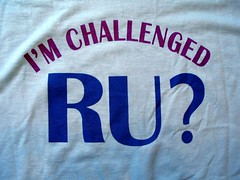Today I spent the morning, along with approx. 100 other members of our staff, listening to four community stakeholders speak about the importance of the library to our community as we embark on Imagine 2010..
- Peter Gorman, Superintendent to Charlotte Mecklenburg Schools talked about the library as the school’s key partner in literacy development and the challenges that we face. It’s true CMS has a great challenge ahead of them, but it’s not only the school’s challenge, it’s all of ours.
- Harry Jones, the County Manager, spoke about the importance of partnerships and the changing dynamics of our community which, with limited land areas, is in the process of revitalizing itself from the outside in. The need for services using new models will be paramount in the future. And with cultural changes and the influx of new immigrants, we will need to embrace innovation and flexibity to meet the needs of our constantly changing community.
- Jennifer Roberts, County Commissioner, highlighted the foundation of love of learning, books, and the library as vital place of civic activity for our community.
- And finally Bob Morgan, Chamber of Commerce President, spoke to (among many other interesting things) the needs of community development and the library’s role in workforce development.
Not once among the stakeholder’s talks (all of which were exceptional btw) did I hear that the library was important because we improve the information retrieval process or can offer excellence in digization. Our value to our community goes far beyond just being an alternative to Google. We need to learn to voice our importance in terms of community value and impact; not merely services/products. And I think Harry Jones said it best when he said libraries are important because they help citizens “thrive and prosper.” It's not what we do or offer that makes libraries & librarians important. It's how we improve quality of life and change lives that matters most.
If given the time, I’d think it would be interesting to ask members of our community to come up with 33 reasons of their own. From the conversations this morning, I know one thing for sure… it definitely would look a whole lot different.
So here’s a start at a new list of reasons that I gathered from what I heard…
- A literate society is import for our community to prosper. Libraries provide vital services and resources that assist in the literacy development.
- Our school and education systems are challenged and the need to raise our student’s achievement levels is important to the entire community. Libraries are the most important community partner to achieving this goal and with stakes this high this is perhaps our greatest legacy.
- Community demographics are changing fast and new citizens need a trusted institution that can assist them with navigating the territory. Libraries serve as a vital community resource in helping both “newcomers” and “lifers” find their way through the forest.
- Workforce development is paramount to a thriving community. Libraries provide learning resources, computer skills training classes and access to online resources for job applications, resume creations and career development.
- As a knowledge rich society, people need a place to exchange ideas. Libraries are community gathering places that encourage conversation, dialogue and the exchange of free ideas.
- … it’s your turn
So how about it? I’ve started off the first five. What can you add to this list? Why not join me in asking a stakeholder in your community why libraries are important … you just might be pleasantly surprised. :)











 I’ve known that SJL was going to feature the Teen Library Second life project for a couple of months now, but seeing the flying avatar on the cover just makes it better. :)
I’ve known that SJL was going to feature the Teen Library Second life project for a couple of months now, but seeing the flying avatar on the cover just makes it better. :)